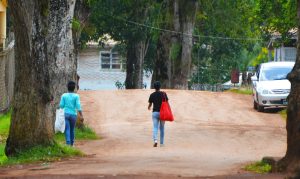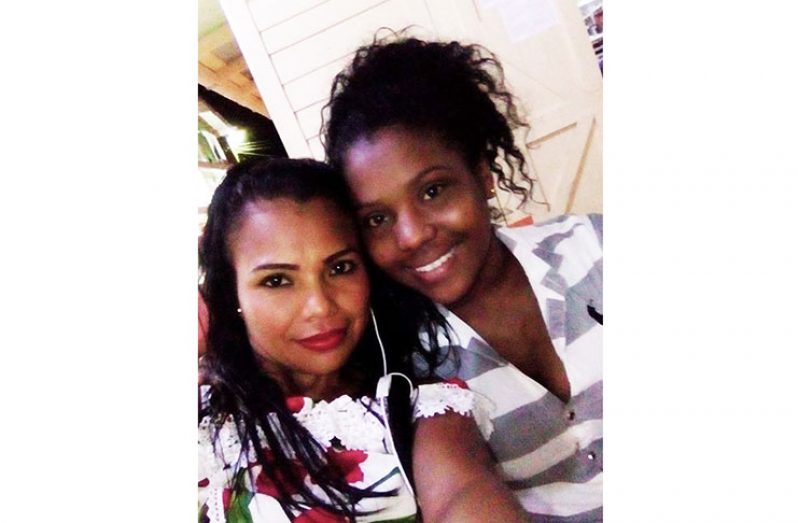By Alva Solomon
THEY walked for miles, using shortcuts to get to customers at the hilly communities within the Mabaruma sub-region. Some days it rained, other days they contended with the sun’s scorching heat.
But for six months, Susana James Valenzuela and her sister, Samantha, trekked the steep slopes of the North West District town and nearby villages, selling bread, building on a skill her mother taught the siblings when they were children.
Relocating to Guyana from Venezuela proved a difficult task for many of their countrymen, and as such, the duo wanted to be independent.
The women could be seen greeting customers within the town, and for many at Mabaruma, it was a sight for sore eyes, since the sisters were undertaking a practice which many in the area were familiar with, as, in the past, persons would walk door-to-door, making that extra dollar.
LEAVING THE DESK-JOB
Susana told the Guyana Chronicle that in mid-2018, she and her sister relocated to Guyana from Venezuela. She said she left her desk job in Venezuela behind, since times were hard, and every day, as the economic situation deteriorated, she thought of many ideas to make things better for her family, especially her son.
The single-mother, who is in her late 20s, said that she spent her entire life in Venezuela, and knew very few words in English. She said it was a difficult process; moving to live in a country she knew nothing much about, except for members of her extended family who only spoke English.
She said that after moving to Mabaruma last year with her sister, the duo searched for jobs in the area, but most of their country folks had already filled the jobs on offer.
“So we ask my cousin to help make a oven,” she said, as she tried to perfect her English. Her cousin, who is also Venezuelan, used a few pieces of wood, zinc and other heat-trapping materials to build the oven.

WALKING AND SELLING
In August 2018, Susana and her sister set out to start the venture. She said at first, they walked the roads within the town of Mabaruma, looking for customers. Later, as they made additional loaves of bread, they decided to travel to the other nearby communities.
Their routine would start soon after lunchtime, and they would walk within Mabaruma. And after visiting their usual customers, they would take a bus and travel through several communities. “The hard part was to walk back and sell,” she said.
She noted that they would take shortcuts, once they appeared safe, and by nighttime they would return home. “One time we visit a man at Barabina Hill, and he tell we how he sorry fuh we,” she jokingly said, adding that many persons gave the siblings words of encouragement.
Asked who taught her to make bread, Susana explained that while growing up in Venezuela, her mother baked bread, and during this time, she and her siblings grasped the skill. “So we come Guyana and use that,” she noted.
PROSTITUTION NOT AN OPTION
According to the petite woman, many Venezuelan women who left their homeland in search of greener pastures find themselves turning to prostitution to make ends meet. But she and her sister were determined not to fall into that bracket.
She said that earlier this year, she moved to the capital city with her son. The day after she arrived, she went downtown in search of a job, and managed to secure one at a business place on Robb Street the same day.
Adjusting to life in the city was another hurdle, but according to Susana, she is determined to achieve her goals. As she chatted, she noted that she is now familiarising herself with the names of streets and places in Georgetown and its environs.
LOST AT PARIKA
With a chuckle, she recalled an experience she had in which she and her Venezuelan friend ended up at Parika, and were about to board a ferry, thinking they were heading to Georgetown.
As she laughed, she said that the duo went to a friends’ party somewhere close to Tuschen. The following morning, her friend told her to walk to the road and take a bus to get back to Georgetown.
Susana laughed as she recalled taking a bus and disembarking at a busy area, and according to her, she recalled Georgetown being close to a river. She said that as she and her friend were heading to the ferry, they chatted about what they will do when they reach Georgetown.
“A man hear me and ask where we going,” she said. He later advised them that they were in fact at Parika. She said the two had a hearty laugh, since they were moments away from boarding the ferry to Supenaam.
Susana lives with a relative at the moment, but she is planning to find her own apartment soon. “I want to able to do things on my own,” she said. She said that while her sister opted to remain in Mabaruma, she plans moving to Georgetown soon.
Susana has ruled out returning to Venezuela. She said that although she spent almost her entire life in the Bolivarian Republic, Guyana is now her home, and she is determined to ensure that she is able to live a comfortable life right here in the years ahead.


.jpg)











